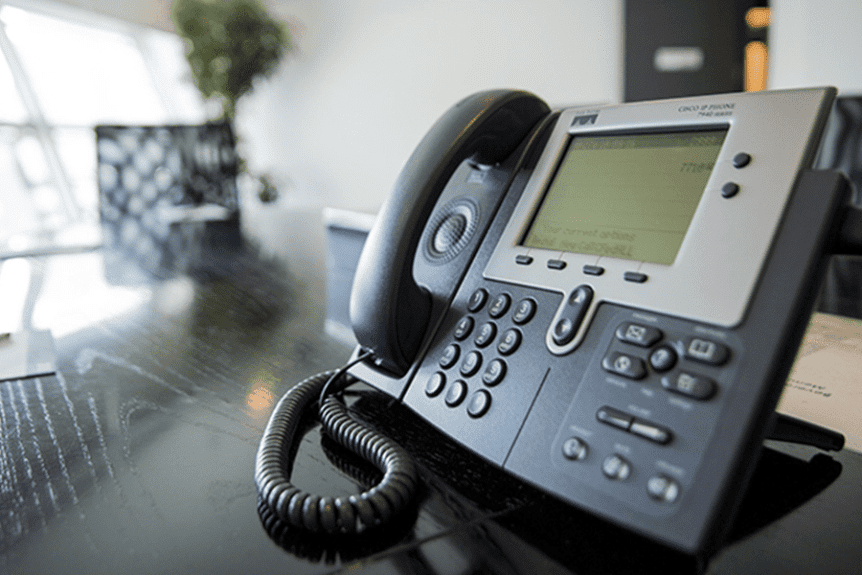The debate around which phone system to choose, between cloud-based and on-premise, has been around for a while. With the rise of digital connectivity, combined with the increased use of software-as-a-service (Saas) options, the debate has intensified further. Unfortunately, you will come across complicated, varied, and sometimes biased opinions. Phone vendors will advise you to choose one over the other, based on what they are selling. The reality is, each method of deployment has its pros and cons. Furthermore, both systems have fundamental differences and features, which you should know before making a decision. With that said, here are pros and cons of each system

Cloud-based Cloud-Based Phone Systems
Also known as hosted VoIP or hosted PBX, a cloud-based phone system is one where the service provider is responsible for hosting the IP PBX, as well as providing the technology needed to ensure the service runs smoothly. In short, all the phone’s programming is located online instead of maintaining hardware in the office. The service provider charges monthly fees, depending on the minutes used, as well as other features. Additional features come at an extra cost. There are both metered and unlimited subscription packages to suit different organizations.
Pros
- Minimal Hardware Requirements
Cloud-based Cloud-Based Phone Systems require minimal or no hardware at all. Most of them are compatible with numerous communication systems used in an office, including fax machines, office desk phones, as well as smartphones. With the elimination of costly hardware requirements, these systems are cheaper to install. Customers only need to pay subscription fees and other costs that come with the features they need.
- Geographic Flexibility
With a cloud-based phone system, you can make calls from any part of the globe. In short, you don’t have to be close to your desk phone. As long as you have a working internet connection, you simply need to set up the phone, connect your laptop and then use your smartphone or a softphone to make a call. These phones give you the flexibility of working from home, from the cafe or even on the go. You can call your workers or business associates from any part of the globe, as long as you have a working internet connection.
- Highly Reliable
Since the components of these Cloud-Based Phone Systems are not hosted in one location, customers rarely encounter service downtime or disruptions. Cloud-based Cloud-Based Phone Systems rely on geographic redundancy. A service provider can have different servers, which can be a replica of the other. For example, a service provider can have servers in San Diego and Philadelphia. Any of those servers can be used as a backup when the other has downtime.
- Ease of Expansion.
A cloud-hosted system is easy to expand, or add handsets, with a small incremental increase in monthly costs. As new phone-needs arise, the cloud based system easily adapts to include new or additional features.
Cons
- Reliance on the Internet
Some cloud-based Cloud-Based Phone Systems rely on wireless internet connections or the local service provider. Therefore, call quality depends on connection quality. If your internet connection is poor, then you may not be able to make calls. Also, if the calls manage to go through, the voice will not be consistent when the internet connectivity is poor. If the connection goes out completely, the phone system is unavailable.
- Vendor Lock-in Period
Some service providers may require you to pay a huge initial installation cost or require you to subscribe for a certain number of months. For example, a vendor will lure you with a discount if you subscribe for a longer period. However, customers are at a risk of being stuck with poor services, due to such arrangements.
- Surprise Usage Charges
As much as some service providers offer unlimited calling packages, others will charge a flat rate for a certain number of minutes per day. For example, they will charge a flat rate for 1,000 minutes per user, per month. Once you exceed these allocations, you will be charged according to a variable or fixed rate-per-minute. Therefore, if your company has many team members, you may end up with shocking bills.
On-premise Cloud-Based Phone Systems
Commonly known as IP PBX, on-premise Cloud-Based Phone Systems resemble traditional PBX systems since they reside at a particular location. They can be installed in a phone closet or in a computer equipment room. The signaling is conducted via an IP phone, which is then routed to the IP PBX server through a LAN.
Pros
- Lower costs over time
With a premise-based phone system, the cost will be greater as compared to a cloud-based one due to the additional hardware required. However, its operational costs tend to be lower after some time.
- Flexibility in dial-tone options
Most small enterprises have 2 to 3 traditional phone lines. Such companies can then utilize 1 or 2 of these lines for making calls and the extra one as SIP trunk delivered via the internet. Therefore, if one service goes down, especially the internet phone, the companies can always rely on the traditional phone lines to make calls, leading to minimal service disruption. You can also modify a traditional phone system to meet your needs.
- More Control
When you have an on-premise phone system, you tend to have more control over its operations. The phone lines, as well as its extensions, are all under your management. This is one of the biggest reasons why people prefer the on-premise phone system as opposed to the cloud-based phone. Also, integration with existing CRM software is easy, since most on-premise Cloud-Based Phone Systems are designed to work with all the technology tools that your company is using.
Cons
- High Setup Costs
Setting up on-premise Cloud-Based Phone Systems comes with higher setup costs as compared to the hosted option. These costs are associated with purchasing the phones, the server, the switch, as well as the licensing. Furthermore, these phones cannot operate without these components, which means the costs are mandatory.
- Geographical Constraints
Since on-premise phones are located in a fixed location, be it your home or office, it’s impossible to conduct calls while traveling. If you want to make any call, then you must be next to the phone. It, therefore, lacks the geographical flexibility offered by cloud-based Cloud-Based Phone Systems.
- Difficult to Expand
A premise-based system will generally require a license, a handset and a little bit of time for setting it up. At a certain point the premise-based system will reach a limit which will trigger a larger purchase of an expansion to the existing system to handle additional handsets or an upgrade or replacement to a larger system capable of handling more handsets.
Final Thoughts
Choosing whether to install a cloud-based or on-premise phone system depends on various factors. Both methods have cost considerations, pros, and cons to take into account. In short, there is nothing that is one-size-fits-all. Ultimately, the decision to choose one over the other depends on a company’s budget plus current and potential needs.
At Entec Systems, we take everything into consideration when helping your company choose the best phone system for your needs. For instance, one of the challenges with VoIP over the Internet is the unreliability of consistent traffic delivery across the internet. Voice traffic requires packets to arrive timely and in order. The internet cannot guarantee that kind of delivery. So for customers that might have spotty internet connectivity or a very high need for reliable voice traffic we typically recommend a dedicated circuit from the client site to the cloud provider’s data center. This provides a dedicated separate path for the voice traffic to get to the cloud provider that can be controlled and quality enforced.
We have the right professionals with deep knowledge of VoIP Cloud-Based Phone Systems that can evaluate your unique situation and translate these issues into recommendations for your business.
Call 800-716-2544 to speak with us about a phone system for your business.

